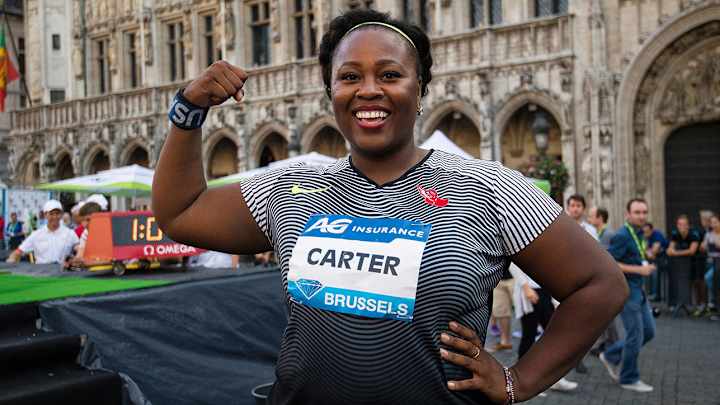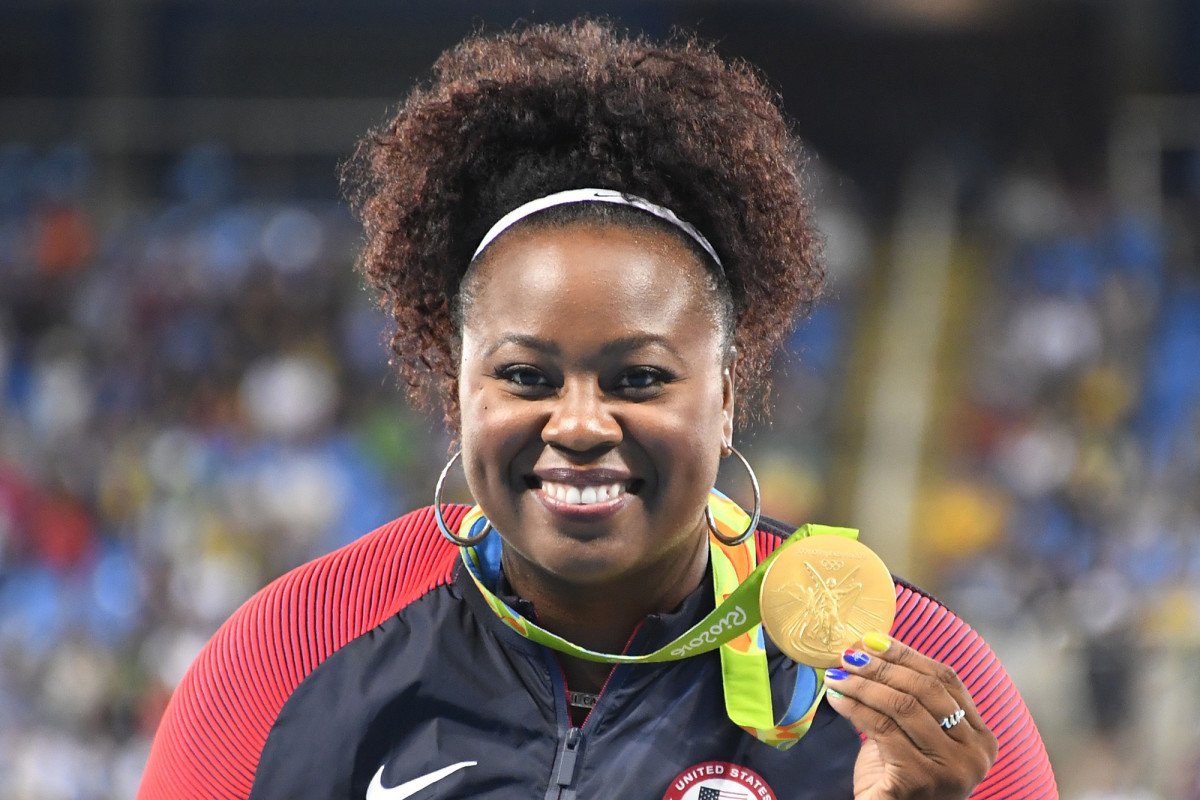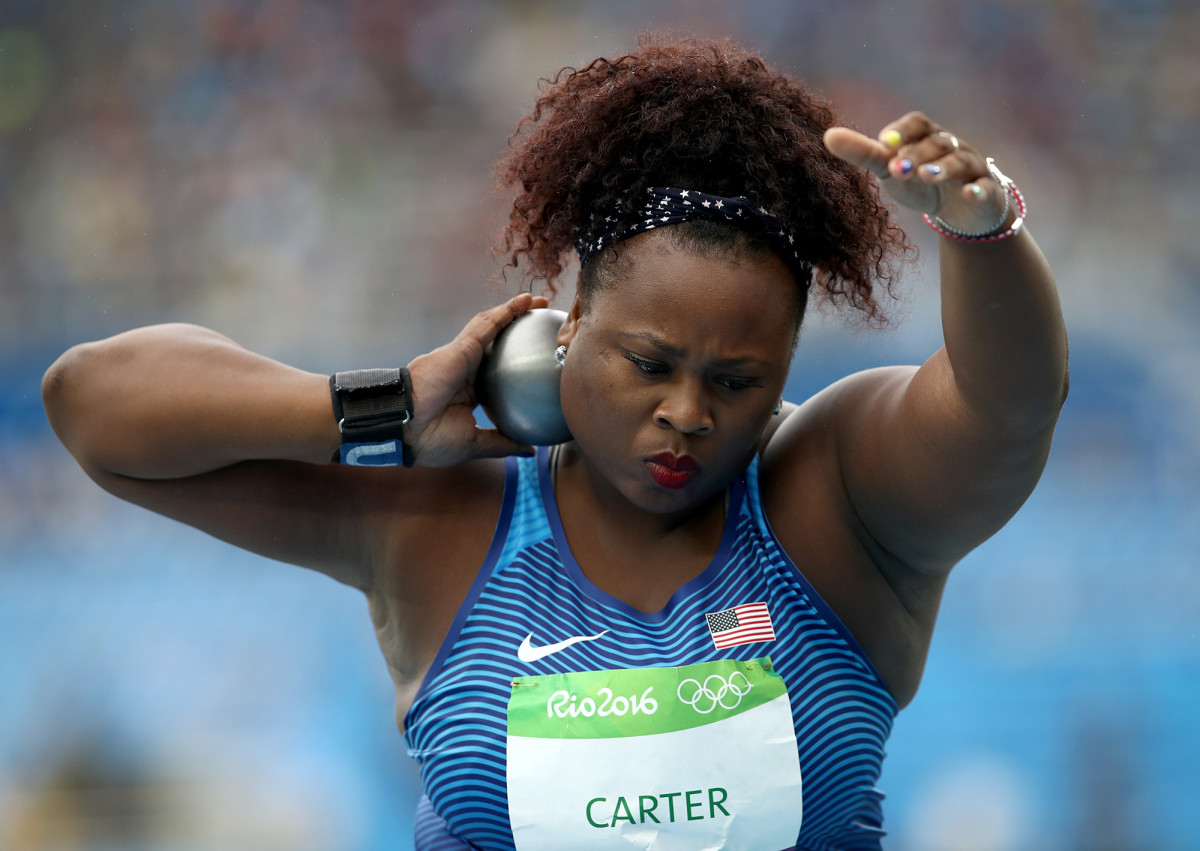U.S. Olympic shot-putter Michelle Carter on how she mentally prepares for competition

Michelle Carter provided one of the most surprising moments of the 2016 Olympics in Rio de Janeiro when she won gold and broke the American record on her final throw of the evening with a 67-foot, 81/4 heave.
Carter became just the second American woman to medal in the shot put and the first U.S. gold in the event. The gold medal also goes well with her father’s silver medal in the shot put from the 1984 Olympics. Michael Carter, also a three-time Super Bowl champion, and Michelle became the first father-daughter combo to win medals for the United States at the Olympics.
Carter made the most of her third Olympics after placing 15th in Beijing in 2008 and then sixth in London four years later. Due to doping sanctions on Belarus’ Nadzeya Ostapchuk and Russia’s Yevgeniya Kolodko, Carter has moved into fourth place in the rankings.
We caught up with Michelle Carter when she recently stopped by the Sports Illustrated offices to discuss how she approached her third Summer Games mentally.

Chris Chavez: You’ve got three Olympic appearances on your resume and each time out you took baby steps for a higher finish and then last summer, you ultimately won. How much of that is attributed to handling the pressure of that stage and getting used to it.
Michelle Carter: The definition of insanity is doing the same thing over and over again, right? I always figure that as you experience life and things, you usually learn and pick up on things that you can do better. That’s how I look at my career over time. Each time, I took a piece of those meets and those experiences so that I could put it together for the grand finale. I told myself, “OK, Michelle. Last time, you were really excited about this and by your fifth throw, you were super tired. Don’t get so excited and calm down to pace your energy.” I walked myself through things like that. I also realize that I do this at practice. I learn how to put myself in situations at practice that cause me to zone in on what I’m trying to accomplish at meets. I try to make my practice surrounding as close to competition pressure to focus on what I need to do on the big stage.
CC: So what’s that look like in practice? The Olympics brings on the crowd, the competitors, the element of waiting around for the. How do you simulate that?
MC: I’ve competed for so long that I’m used to the timing at a track meet. I know how to pace myself and I do drills in between my throws. We have flights of 15 or 16 throws and if I just sit there, then I’m trying to get cold.
CC: How big is the pressure of the Olympics? Your job is focused around this stage that comes every four years.
MC: In the beginning, it was a lot. It was the Olympics. Then I competed and I realized that I throw against these girls all the time. The only thing that changes is the name of the event. So I figured that if I can get first, second or third at a regular meet against the same people, then I can do the same thing at the Olympics. I didn’t put it on a pedestal and treated it as just another track meet where I can do well.
Joan Benoit Samuelson turns 60, wants to break three hours for marathon
CC:Last summer, I took a dive into some of the financial impacts behind a third and fourth place finish at the Olympic Trials. It’s make or break for some athletes and in the throwing events especially. Back in 2008, did you realize that financial toll and how did you handle that?
MC: At my first Olympics, I didn’t have a contract and I wasn’t making any money. After my first Olympics, I was working at 24 Hour Fitness at the front desk. I would go to practice in the morning, run home, shower, grab some food and then go straight to work. I didn’t get off of work until 10 or 11 o’clock at night. I had to be at practice by 8 o’clock in the morning. I asked myself, “What do I have to do in order to get to the next level as an elite, make money and not have to work at the gym?’ I had to get to the finals at a championship. I remember at 2009, I finished sixth place at the world championships and then got a contract. You have to be at the top to make money in this sport and it’s sad because there are some sprinters who never make a national team or finals at the U.S. championship and they make more money than me. At the same time, I don’t do this because of money. If I did, I would’ve left a long time ago. I love what I do and know I’m good at it. It helps that I can get financial support along the way.
CC:How noticeable was it not having to worry about a second job and how do you deal with stress nowadays?
MC: Soon after signing the contract, I think I took on a different kind of stress. How I get paid now is performance-based. If I have a bad year and I’m not getting paid, how am I going to pay my bills? Now, I have to make sure that I place in certain meets or stay in certain rankings in order to make money and take care of what I need to. As an athlete, you have to believe that’s what you do. I believed I could make the top three consistently and so the focus in my throws shifted from bills to being the best I can be. Everything will take care of itself.

CC: Before a race, I’ll sometimes joke around for a few minutes and then focus on what I have to do and it’s a serious shift. What’s being “in the zone” like for a thrower?
MC: I think everyone handles it similarly. Despite whatever we’re doing, we’re nervous. There’s some jitters. It’s different for runners because they do their routine maybe three times before the heats, semis and finals. As throwers, we’ve got to do it six times. It’s pacing out your nervous energy.
CC: Are you one of those jokers or talkers as you’re waiting in the call room?
MC: I’m not a talker. In Rio, I was a little more relaxed because it can be intense in that back room. You have other events going on and feed off their energy. The officials also have their own energy that they’re giving off because they have to do their jobs right. I kind of know what works for me, when I can shut it down and when I can relax to talk a little bit.
How rock climber Tommy Caldwell re-learned his craft after sawing off his finger
CC: Who do you talk to outside of competition to help build that mental strength?
MC: My dad (Olympic shot put silver medalist and three-time Super Bowl champion Michael Carter) is my coach and so he gives me his tips and ideas. Through USATF and the USOC, we have access to some sports psychiatrists and I’ve built a relationship with one of them there. I always check with her to see if I’m thinking right and that helps a lot. I’ve got friends and family as well that will listen.
CC: Since 2012, you’ve climbed up in the rankings due to doping violations by others. At any point in Rio, did you think “This time it’ll just be easier, if I just win the dang thing?”
MC: Yeah. It’s funny because I just got the certificate that tells me I’m fourth at the 2012 Olympics in London. Crazy, right? I always said that if I wait long enough, I’ll get a medal for 2012. I’m patient. I’ll wait. I’m often asked, “How does it feel to know you’re competing against people that cheat?” My goal is that if I can be the best that I can be, I can beat you on your dirtiest day. I don’t put my energy or focus there but it’s about executing. In 2012, I was fine with my sixth place finish because I gave it my all and I had nothing else to give. I was OK with that. It just so happened that I started climbing up and I said, “OK! I’ll take that too!”
Triathlete Gwen Jorgensen runs up to 100 miles per week—while 7 months pregnant
CC: So it’s not a thought that comes up during competition but afterward?
MC: To be honest, I don’t think about it at all. I feel like if I give them any attention or energy then that takes away from me. Why think about what someone else is doing when I’ve got something in my own world. I just focus on myself.
CC: After winning gold, how do you approach 2017?
MC: It’s been different because I’m busier than I thought I’d ever be. Also, it’s about managing my time to get quality workouts in. I see it as “Michelle, if you’re gonna want to get gold again. You’re going to have to buckle down and still work on some things.” That’s always on my mind. When you’re No. 1, you’re gonna have a target on your back. I always believe there’s a time and place for everything. If it’s time for someone else to win, then that’s their time.
CC: How drained were you after the Olympics?
Garmin Vivosmart 3 review: Testing out the tracker's stress monitoring, rep counter, more
MC: Oh my gosh. I don’t think I’ve been able to fully rest from it. After 2008 and 2012, I was just sleeping for 14 or 15 hours for like three days because I was just tired. This time because of the energy, love and support, I keep saying, “Let’s go. Let’s keep going.” It turned out well and I’m still going.
CC: But in terms of a break from actual shot putting how long did you go? Some runners are known to take weeks off after the Games.
MC: I didn’t throw for three months. I didn’t do anything for three months. It also felt good not to but I also felt weird. My body needed that break though. In previous years, I’d come home and undergo therapy or pilates because I had some injuries and wanted to stay fit. This year’s focus was to rest and we’ll assess what happens for next year since it’s an off-year for us without a major championship.
CC: High school coaches tends to say that while you’re not working, just remember that your competition is out there doing working to beat you. You can’t worry about that at the elite level.
MC: Nope. You can’t! I have too much to do to keep up with other people. If I constantly keep comparing my work to someone else’s then I’ll just keep selling myself short. You have to figure out what works for yourself and don’t measure up to what others are doing. Practice and resting is sometimes what’s key.
